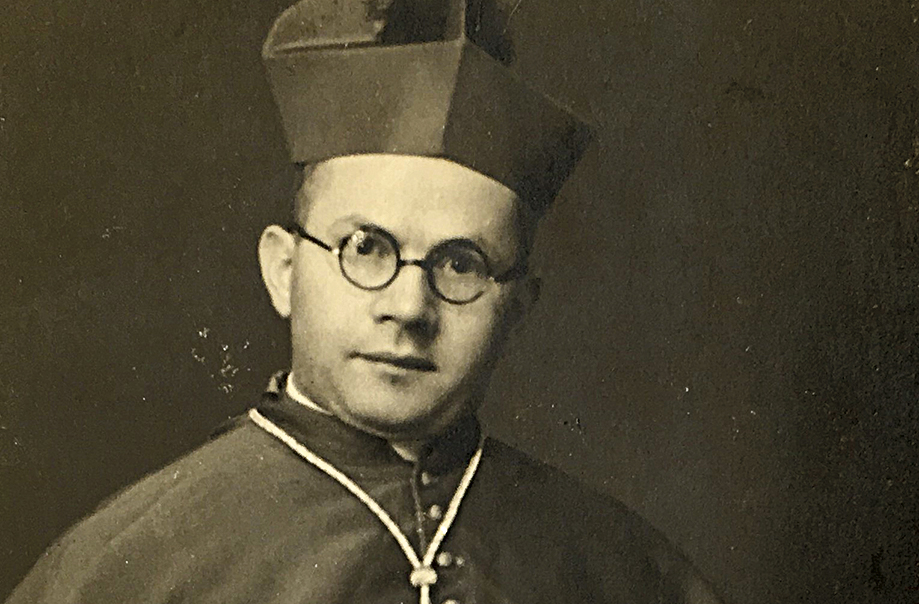On December 18, the Bulletin of the Holy See published the Holy Father's authorization to the Dicastery to promulgate the decree of martyrdom of the Servant of God Eduardo Profittlich, of the Society of Jesus, Tit. Archbishop of Adrianople, Apostolic Administrator of Estonia. One more step towards the beatification and canonization of the first bishop of Estonia, which the Catholics of this Baltic country were eagerly awaiting.
Profittlich is on his way to becoming Estonia's first saint and, as Bishop Philippe Jourdan, bishop of this newly named diocese, points out, "That the Church proclaims my predecessor, Eduard Profittlich SJ, blessed is very important for Estonians. Obviously for Catholics, but also for non-Catholics, because he shared the fate of 20 % of the country's population: deportation and death. It represents a key moment in the history of the Estonian people in the 20th century. When I meet the president of the nation he always asks me how the process of Monsignor Profittlich is progressing, because it would be something very significant for the whole country."
An early beatification
The cause of this Jesuit bishop began in 2014. At that time, the documentation work began, which was difficult since he was hardly heard from during the time of his arrest.
In 2017, the bishop Philippe Jourdan initiated an investigation into the diocesan process for Profittlich's official beatification, which was completed in 2019, and all documents were handed over to the Congregation for the Causes of Saints in Rome.
German by birth, Estonian at heart
Of German origin, Profittlich was born on September 11, 1890 in Birresdorf, Germany. In 1913, he entered the novitiate of the Society of Jesus in Heerenberg. He was ordained a priest in 1922 and moved to Krakow to continue his studies; after several pastoral assignments, he took his final vows as a Jesuit on February 2, 1930.
His attention to the faithful and his intense pastoral life made the then apostolic administrator in Estonia, Archbishop Antonio Zecchini, turn his attention to this religious who, in 1931, succeeded him as head of the small Catholic community in Estonia. He learned the language and, in 1935, obtained Estonian citizenship. He was ordained bishop in 1936, the first Catholic bishop in Estonia after the Lutheran Reformation.
In spite of the few years he was able to carry out his pastoral work, Eduard Profittlich's imprint on the Church in Estonia was deep and lasting. He renewed the Catholic structure in that community, strengthened the faith of Estonian Catholics and was a promoter of Estonian culture through literary publications.
The historian Toomas Abilis, who has deeply studied the life and personality of Bishop Profittlich, emphasizes that he was "polite, disciplined and determined in the performance of his duties. He was deeply faithful to the teachings of the Church and its hierarchy. A man dedicated to pastoral work, he had many friends and was a great preacher".
Arrest and death
At the outbreak of World War II, he and his small community were arrested on June 27, 1941 by the Soviet authorities.
Eduard Profittlich was transferred to Kirov in Russia, 2,000 kilometers from Estonia. For several months he remained in prison number 1. Other preeminent names of the Estonian nation, such as the intellectual Eduard Laaman or the politician and businessman Joakim Puhk, were shot in this prison. It was an inhospitable and overcrowded prison. Each cell, about 50 square meters in size, could hold up to 100 inmates. It had no heating and deaths from hypothermia were frequent.
During Bishop Profittlich's time in Kirov he was continuously interrogated with inhumane methods.
On November 21, 1941, a trial was held in which he was accused of "spreading anti-Soviet slander, concealing the flight of Catholics abroad, praising the German army and counter-revolutionary agitation."
The guilty verdict condemned him to death by firing squad. By then, Bishop Profittlich's health had weakened to the extreme, due to the nightly interrogations that prevented the prisoners from sleeping, the cold and hunger. Eduard Profittlich died on February 22, 1942 in his prison cell, one day before his execution.
In his last letter to his relatives, Eduard Profittlich once again asked them to pray for him, "so that God's grace may continue to accompany me, so that in all that awaits me I may remain faithful to my holy vocation and duty and to Christ and sacrifice all my vitality for my homeland, and if it is His holy will, even my life." A surrender that, as he wrote in this letter, "would be the most beautiful end of my life".








